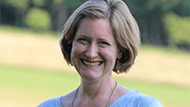Alyson Holt – Lung Cancer Patient Story

In February 2019, Alyson Holt, a mother of four, was experiencing worsening back pain. After visiting a chiropractor and doing physical therapy throughout the spring, she went for an Xray which showed some irregularities. An orthopedic physician told her that something was “eating away at the bones,” and it was likely cancer.
“My first thought was ‘I have to be here for my kids,’” Alyson said. “I could keep it together until I thought about what their life would be like without their mom.”
She was immediately referred to UPMC Hillman Cancer Center in Monroeville, where she received a PET-CT to confirm what was going on. As a Murrysville resident, Alyson was grateful for UPMC Hillman Cancer Center being close to home.
“Everything in Shadyside is at Monroeville – including very accomplished doctors,” she said. “They are very good at listening and spent a lot of time with me, especially that first consultation when I was just shocked.”
Alyson’s scan lit up throughout her pelvic bones so they rushed her to a biopsy. For weeks, pathology couldn’t confirm the specific diagnosis, other than it was some form of metastatic carcinoma. Not wanting to waste any more time, Alyson began radiation, and pathology later confirmed that the cancer originated in the lung. Alyson consulted with Dr. Tim Burns a lung cancer specialist, and when the results of the genetic testing of the cancer tissue came back, they were finally able to arrive at her official diagnosis -- metastatic non-small cell lung cancer with a BRAF v600e driver mutation. This mutation is not very common in lung cancer patients but is known to respond to oral medications that target the specific mutation.
She continued her radiation treatments and began taking the oral chemotherapy in September. Alyson got through her treatments and side effects including extreme pain, swelling, and fevers as best she could, and by December her PET scan results proved that the treatments were working. Unfortunately, in April of 2020, at the height of the COVID-19 pandemic, Alyson began having more extreme pain and numbness in her legs. Test results in May confirmed that her cancer had recurred due to resistance, and at that point the plan was to stop the medication targeting the BRAF v600e mutation, and start stereotactic radiosurgery, platinum-based chemotherapy, and immunotherapy.
Alyson spent her summer going through her treatments dealing with intense side effects but spending as much time with her kids as she could. Her September scan showed much improvement, and by December – after nine months of targeted treatments and six months of chemotherapy and immunotherapy – her scans were clear. She remained on maintenance chemo and month after month, her scans continued to show no evidence of disease. In April 2021, Alyson decided, after consulting with all of her oncology team, to take part in a clinical trial where she was taken off of chemotherapy and immunotherapy. In May 2021, Alyson received her last infusion and has had clean scans ever since.
“Don’t be scared of clinical trials,” Alyson said. “I’m glad that I went through with it. I read about cancer research every single day, but I don’t panic as much as I used to.”
Alyson has nothing but praise for her entire care team, from the doctors to the nurses.
“I always felt respected, and I so appreciate the doctors who, even through their busy days, will talk to a patient about the pros, cons, the science, and have that dialogue. The mutual respect is super important.”
“All the staff at Monroeville are friendly and caring. They always make sure you’re okay and answer any questions you have. They’re compassionate, thorough, and upbeat,” she said. “They even bought me a cake and sang, since my birthday was on my second day of chemo. They didn’t even know me yet, and it was really touching.”
Today, Alyson is feeling great and is back to her “normal mom stuff.” She said, “I feel stronger and better. It’s nice to go live my life.”
Her biggest advice to other cancer patients is to record everything at your appointments, and to find other patients who are in a similar situation. “I think you have to let yourself feel the grief and heaviness of it,” she said. “Let the waves crash over you. "There will be ups and downs. Reach out and find that group who has a similar diagnosis to you, because they will be a tremendous source of support and empathy and hope."

